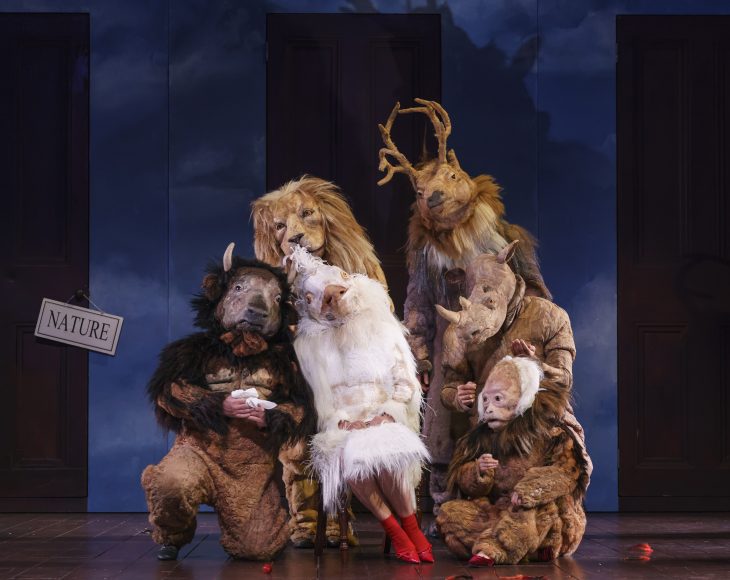Operas are like buses. Both are filled with pensioners and take ages to get anywhere, but more importantly they always seem to arrive en masse. You wait ages for a Magic Flute, then five come along at once. Opera North started us off in January, Welsh National Opera and English National Opera are currently following suit, with Scottish Opera and Glyndebourne covering the summer shift. It’s a mess and, when you consider that at least four of these are touring with inevitable overlap, a wanton, self-destructive splitting of an already small opera-going audience.
With more Flutes than a school wind-band to choose from this season you can afford to be picky (assuming you haven’t already exhausted yourself with the three concurrent Katya Kabanovas). Among so many new productions Welsh National Opera’s 15-year-old revival doesn’t seem like an obvious winner. But if Dominic Cooke’s staging is no longer the glossiest in the pack, it has something neither of its current rivals can boast: warmth.
Mozart’s Flute is famously an opera stained with racism and chauvinism, and steeped in suspicious Masonic philosophy to boot. It’s an unpalatable combination, even when washed down by such a delicious score, and one that increasingly calls directors to arms. First Netia Jones at Garsington last summer and now James Brining at Opera North have responded dutifully with earnest interrogations of sexual and social politics. Simon McBurney’s staging for English National Opera sidesteps the issues, instead dazzling the audience with visual effects, creating a show of chilly beauty and wonder. But whatever happened to the fun that originally drew Mozart’s audience out to the Viennese suburbs in such crowds?
Saturated in the hot, bright shades of Dali and peopled with Magritte-style figures and what looks like the entire props table of a surrealist’s studio, Cooke’s Flute (revived here by Caroline Chaney) arrives with a disarming grin. Just as Papageno’s magic bells turn wild beasts and would-be assailants into harmless creatures, so the production’s deft humour and daft imagery (Tamino’s monster is here reincarnated as a giant lobster — all snapping claws and frothing antennae) set benignly to work neutralising the libretto’s problems. In a world of flying bicycles and lions who read the Financial Times, misogyny becomes just another absurdity.
Jeremy Sams’s brisk, witty English translation is the engine that drives this irresistible drama, getting plenty of laughs from an all-ages matinee crowd and giving Mark Stone’s personable Papageno all the comic ammunition he could need. His hapless bird-catcher, quicker with a quip than a net, is chivvied along by the bracing good sense and energy of Anita Watson’s prettily sung Pamina and Ben Johnson’s slightly underpowered Tamino. The Tom Hollander of tenors, Johnson still feels like a character singer forced into the blandness of Mozart’s milquetoast leading men. A rich supporting cast and superb work from WNO’s choristers all add up to a stylish whole, marred only by some counterintuitive speeds from conductor Thomas Blunt (who directs just two performances during this run) and a few anxious disagreements between stage and pit.
The guileless directness that gives this Flute its charm works less well for English Touring Opera, whose new Idomeneo tours the UK this spring.
You can see director James Conway’s logic. After a rash of interventionist productions of Mozart’s great opera seria (who could forget Martin Kusej’s fishy failure at the Royal Opera, or Katie Mitchell’s cluttered muddle for ENO?), he has chosen to keep things simple. A story about a vow which, rashly made, must be kept at any cost, about generational tensions and displaced people fighting for recognition and dignity, needs only the lightest of touches to become fiercely and topically weaponised.
But this is more peashooter than assault rifle. Kaftans and a motley collection of pastel-coloured frocks seem to place us somewhere at the turn of the 20th century in a sort of Frederic Leighton-ish Mediterranean fantasy, but to what end is unclear. Frankie Bradshaw’s undistinguished set nods to the work’s classical origins without ever developing this, and the badges pinned forcibly to the clothes of the captured Trojans (green triangles rather than yellow stars, but you get the point) are alone in making any kind of statement. All of which leaves a talented young cast rather at sea.
Because the performances are superb — yet another reminder of the home-grown singers ENO could and should be celebrating. The rivalry between Paula Sides’ Elettra (whose fragile hopefulness, not her erratic rage is most devastating) and Galina Averina’s Ilia, her bright, true soprano at its best in ‘Zeffiretti, lusinghieri’, fizzes with truth, and Catherine Carby is all vocal gloss and suppressed turmoil as Idamante. But the production belongs to Christopher Turner’s Idomeneo. It’s hard to believe that this is Turner’s role debut, so comfortably does the demanding role seem to sit, craggy indecision and discontent erupting into a ‘Fuor del mar’ of startling force and beauty, real lyricism to its musical howl of fury.






Comments